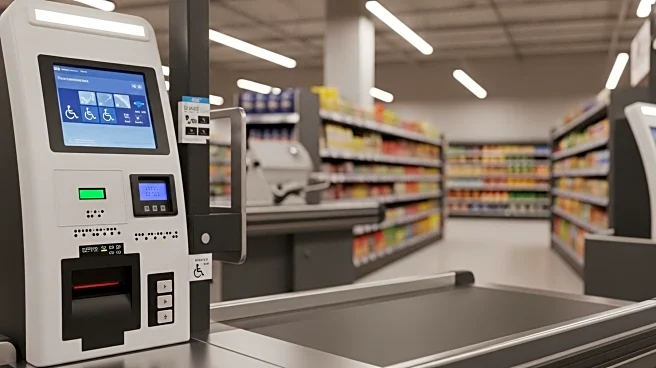What's Happening?
Tesco has introduced new accessibility modes on its self-service checkouts to assist visually impaired customers. This development is part of Tesco's broader strategy to integrate advanced technologies into its operations, enhancing customer experience and operational efficiency. The UK grocery giant has reported a 5.1% increase in first-half sales, reaching £33.1 billion, and a 1.6% rise in underlying operating profit to £1.7 billion. Tesco is also expanding its AI capabilities, optimizing delivery routes to save approximately 100,000 miles per week. The company is planning to open a new semi-automated fresh food distribution center in Aylesford and another at DP World London Gateway by 2029. These initiatives reflect Tesco's commitment to leveraging technology for improved service delivery and operational efficiency.
Why It's Important?
The introduction of accessibility modes on self-service checkouts is a significant step towards inclusive retail practices, ensuring that visually impaired customers can shop independently and with ease. This move not only enhances customer satisfaction but also aligns with broader societal goals of inclusivity and accessibility. By integrating AI and automation into its operations, Tesco is setting a precedent for other retailers to follow, potentially leading to widespread adoption of similar technologies across the industry. The efficiency gains from optimized delivery routes and automated distribution centers could result in cost savings and reduced environmental impact, benefiting both the company and its stakeholders.
What's Next?
Tesco's continued investment in technology suggests further advancements in its retail operations. The company may explore additional AI-driven solutions to enhance customer engagement and streamline operations. As Tesco prepares to open new distribution centers, it is likely to focus on expanding its logistics capabilities and improving supply chain efficiency. The retail industry may see increased competition as other companies adopt similar technologies to enhance their service offerings. Stakeholders, including customers and industry partners, will be watching closely to see how these developments impact Tesco's market position and influence industry standards.
Beyond the Headlines
The integration of accessibility features in retail technology raises important ethical considerations about the role of technology in promoting inclusivity. As retailers increasingly adopt AI and automation, there is potential for long-term shifts in employment patterns and job roles within the industry. The focus on green technology and efficient operations also highlights the growing importance of sustainability in retail, which could lead to more environmentally conscious business practices across the sector.









